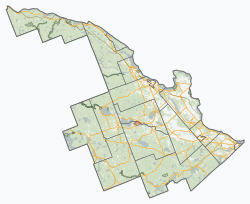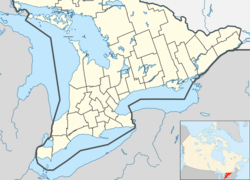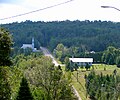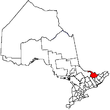Brudenell, Lyndoch and Raglan
Brudenell, Lyndoch and Raglan | |
|---|---|
| Township of Brudenell, Lyndoch and Raglan | |
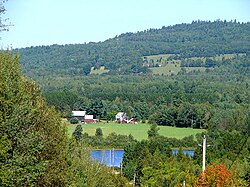 Near Latchford Bridge | |
| Coordinates: 45°19′N 77°24′W / 45.317°N 77.400°W | |
| Country | Canada |
| Province | Ontario |
| County | Renfrew |
| Established | January 1, 2000 |
| Government | |
| • Mayor | Valerie Jahn |
| • Federal riding | Renfrew—Nipissing—Pembroke |
| • Prov. riding | Renfrew—Nipissing—Pembroke |
| Area | |
| • Land | 701.29 km2 (270.77 sq mi) |
| Population (2021)[1] | |
• Total | 1,552 |
| • Density | 2.2/km2 (6/sq mi) |
| Time zone | UTC-5 (EST) |
| • Summer (DST) | UTC-4 (EDT) |
| Postal Code FSA | K0J |
| Area code(s) | 613, 343 |
| Website | www |
Brudenell, Lyndoch and Raglan is a township in Renfrew County, Ontario, Canada. It was formed on January 1, 1999, through the merger of Brudenell and Lyndoch Township with Raglan Township.
Communities
[edit]The township comprises the smaller communities of Bruceton, Brudenell, Copp, Hardwood Lake, Harriets Corners, Jewellville, Latchford Bridge, Letterkenny, Lost Nation, Palmer Rapids, Quadeville, Rockingham, Schutt, Wingle and Wolfe.
-
Brudenell
-
The Madawaska River at Palmer Rapids.
-
Schutt
Demographics
[edit]In the 2021 Census of Population conducted by Statistics Canada, Brudenell, Lyndoch and Raglan had a population of 1,552 living in 694 of its 998 total private dwellings, a change of 3.3% from its 2016 population of 1,503. With a land area of 701.29 km2 (270.77 sq mi), it had a population density of 2.2/km2 (5.7/sq mi) in 2021.[1]
| 2021 | 2016 | 2011 | |
|---|---|---|---|
| Population | 1,552 (+3.3% from 2016) | 1,503 (-9.3% from 2011) | 1,658 (10.8% from 2006) |
| Land area | 701.29 km2 (270.77 sq mi) | 706.24 km2 (272.68 sq mi) | 705.83 km2 (272.52 sq mi) |
| Population density | 2.2/km2 (5.7/sq mi) | 2.1/km2 (5.4/sq mi) | 2.3/km2 (6.0/sq mi) |
| Median age | 55.6 (M: 56.0, F: 55.6) | 53.5 (M: 54.0, F: 52.8) | |
| Private dwellings | 998 (total) 694 (occupied) | 963 (total) | 1031 (total) |
| Median household income | $62,000 | $51,072 |
Mother tongue (2021):[1]
- English as first language: 92.3%
- French as first language: 1.6%
- English and French as first language: 0%
- Other as first language: 5.2%
| Year | Pop. | ±% |
|---|---|---|
| 2001 | 1,565 | — |
| 2006 | 1,497 | −4.3% |
| 2011 | 1,658 | +10.8% |
| 2016 | 1,502 | −9.4% |
| 2021 | 1,552 | +3.3% |
| Source: Statistics Canada[1][5] | ||
|
| ||||||||||||||||||||||||||||||||||||||||||||||||||||||||||||||||||||||||||||||||||||||||||||||||||
Notable stories
[edit]"Al Capone's Hideout", an Upper Madawaska Theatre Group production, is a musical comedy based on the story of Al Capone's stay in the area in 1942, when he and his gang allegedly hid out near Quadeville, Ontario.[7]
See also
[edit]References
[edit]- ^ a b c d e "Brudenell, Lyndoch and Raglan (Code 3547020) Census Profile". 2021 census. Government of Canada - Statistics Canada. Retrieved 2024-07-22.
- ^ "2021 Community Profiles". 2021 Canadian census. Statistics Canada. February 4, 2022. Retrieved 2023-10-19.
- ^ "2016 Community Profiles". 2016 Canadian census. Statistics Canada. August 12, 2021. Retrieved 2018-02-19.
- ^ "2011 Community Profiles". 2011 Canadian census. Statistics Canada. March 21, 2019. Retrieved 2012-02-13.
- ^ 1996, 2001, 2006, 2011, 2016 census
- ^ a b "1971 Census of Canada - Population Census Subdivisions (Historical)". Catalogue 92-702 Vol I, part 1 (Bulletin 1.1-2). Statistics Canada: 76, 139. July 1973.
- ^ "The Pembroke Library History Project". www.pembrokelibrary.ca. Archived from the original on 2011-07-06.

